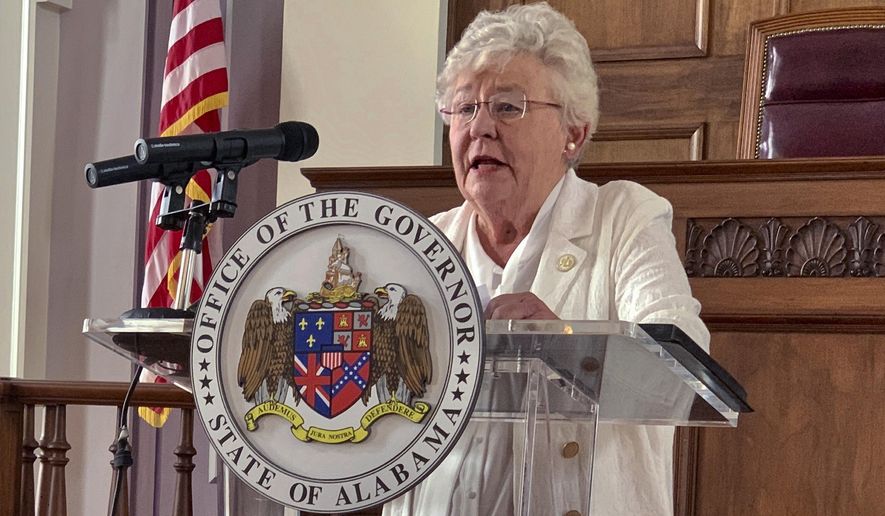Alabama Governor Kay Ivey, a Republican and self-identified Baptist, has sided with athletes from a Seventh-day Adventist high school that had to forfeit a game when the state’s high school sports association balked at rescheduling a playoff game.
Students from Oakwood Adventist Academy in Huntsville, Alabama, could not play in the Saturday, Feb. 19, game because the match started at 4:30 p.m. local time, approximately one hour before sunset, the end of the Sabbath, observed by Adventists and Jews, among other religious groups.
In a letter to Alvin Briggs, executive director of the Alabama High School Athletic Association, Ms. Ivey said she was “most disturbed” by the sports group’s denial of a request for Oakwood to switch time slots with a 7:30 p.m. game.
She noted Faith Christian School, Oakwood’s opponent in that northwest Alabama regional semifinal, had agreed to the change. Also consenting were Decatur Heritage Christian Academy and Cornerstone School, which had the later time slot.
“I’ve read that the AHSAA denied Oakwood’s simple request — not once but twice,” Ms. Ivey wrote. The school, she said, would be “forced either to play a game against the dictates of its players’ and coaches’ faith or to forfeit the game entirely, and thereby lose the chance to continue a hard-fought and hard-earned successful season.”
Ms. Ivey asked the group to respond so its views might be known “as reforms are considered in the coming days and weeks.”
In a separate letter to Oakwood’s principal, Ms. Ivey invited the team to meet with her at the state capitol in Montgomery, and a school official said that visit should take place “within the next week or so.”
Neither Ms. Ivey’s spokeswoman nor state Rep. Mac McCutcheon, also a Republican and Alabama House of Representatives speaker, responded to requests for comment. State Rep. Laura Hall, a Democrat who represents the Huntsville area, also did not return calls seeking comment.
An employee at the Alabama High School Athletic Association said its leadership was away at the state basketball championship and would not be available for comment. Instead, the group cited a letter from Mr. Briggs to Ms. Ivey, in which he insisted Oakwood Adventist Academy had agreed to the group’s requirement they “participate in all playoff games without petition,” or forfeit such games.
“Granting an exemption … for any reason, every time one is requested, would be chaotic,” Mr. Briggs wrote, adding that the group’s “member schools write the rules” and that Oakwood could propose a rules change, but has not done so.
But the AHSAA’s request that Oakwood sign a letter “promising not to exercise their rights was unconstitutional in and of itself,” said Todd R. McFarland, an attorney for the Seventh-day Adventist Church’s North American Division. “We believe that the fact it was given [by the school] is of no legal effect.”
Mr. McFarland added “Oakwood Academy has not made any decisions” concerning legal action against the AHSAA, “but it is exploring all its options.”
On the national level, collegiate athletics has often attempted to accommodate religious observance. In 2018, for example, the NCAA shifted a college basketball game to allow Sabbath-keeping students from Yeshiva University, a modern Orthodox Jewish school in New York, to compete.
Calvin Morton, Oakwood Adventist’s athletic director, told The Washington Times “something needs to change for [other] religious schools” as well as Oakwood.
“To have the governor behind you and supporting reasonable accommodations – it’s huge,” Mr. Morton said.
He said that by asking AHSAA for a time change, “we weren’t trying to forfeit … We were just simply asking, ‘Could you accommodate us an hour, or two or three hours, so that we can play the game and avoid the situation that we’re in now?”
Mr. Morton noted that Oakwood University, also in Huntsville and also owned by the Adventist Church, has seen Sabbath accommodations when its scholastic teams have competed in the Honda Campus All-Star Challenge, an academic bowl for Historically Black Colleges and Universities.
“I would hope to believe that it would be the same across for high school and athletics, but it’s not, unfortunately,” he said.
• Mark A. Kellner can be reached at mkellner@washingtontimes.com.




Please read our comment policy before commenting.